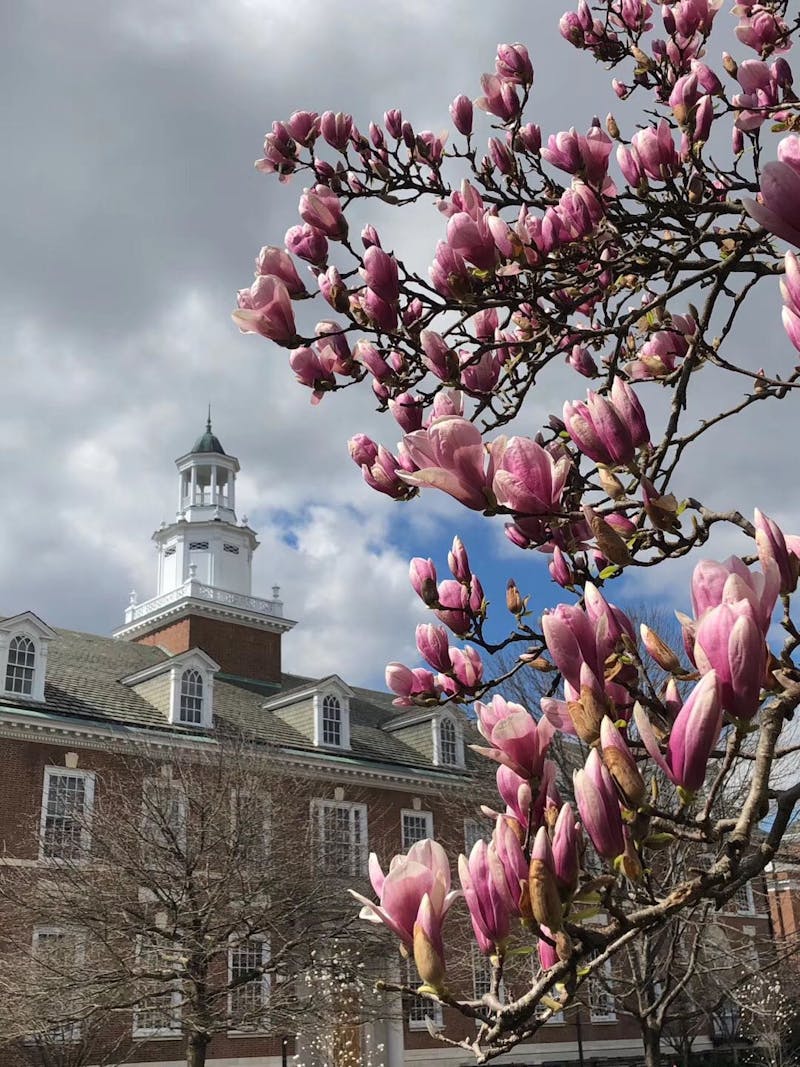
COURTESY OF SHIZHENG TIE
During lockdown, Tie has found a way to escape through nature, among other things.

COURTESY OF SHIZHENG TIE
During lockdown, Tie has found a way to escape through nature, among other things.
2020 has been a year of social distancing and mask wearing, of avoiding the common elevator in my apartment and keeping six feet away from passersby in public. While I was stuck in America, not only was I constantly stressed about the ever increasing COVID-19 cases here, but I also found myself in emotional solitude as the people I love resided 12 hours away.
I grew up in Luoyang, China, spent a few years in a high school in rural Ohio and went to Boston University for two years before transferring to Hopkins. Having moved around a lot, I find myself a perpetual stranger — I never have enough time to form deep, devoted relationships, and that has especially been the case this year with so few in-person interactions.
Having spent a significant amount of time alone since March, I’ve felt especially inspired by Taylor Swift’s folklore, which she wrote and produced in her own solitude. The album was a surprise that came out of nowhere, betraying Swift’s usual months of teasing and Easter eggs. Because in a tumultuous year like 2020, no one can afford a wait.
Swift famously captures a wide range of emotions in her music. This album in particular represents her mind running wild while she is alone. Even though her life under the spotlight is in no way similar to a lukewarm Hopkins life of no parties and all work, I’ve found that Swift’s lyrics grasp me in a sad yet empowering way.
I connect with Swift’s contemplative lyrics and bitter-sweet melodies that make me want to stand up and scream, “I had a marvelous time ruining everything” or “to live for the hope of it all” in a moment of pure emotional catharsis. I’ve found that when I run breathlessly through the woods and connect to nature I feel this same catharsis. I realize how small my worries are in the grand scheme of things.
I used to worry and fear a lot. The red in my national flag that has alarming connotations with the late Soviet Union is my scarlet letter. No matter what I believe or with whom I dream, my Asian face and subtle accent continue to make me a foreigner in this country and, to some, a virus.
In solitude, I have learned to seek introspection that provides me with a refuge from such worry and fear. I write a lot. Prose. Poems. Book reviews. Diary entries. News-Letter articles. I take the emotions that simmer in my mind and let my pen run wild. I read and I write.
Immersed in an overwhelming contemplative ocean of emotion, I threw myself into the fictional worlds of literature. My reading list spans from Stephen King’s ironically morbid The Stand, which describes a post-apocalyptic world after a deadly pandemic, to heart-grabbing environmental novels like The World Is Round.
Instead of feeling angry about political dramas, heartbroken by lives lost or terrified by the uncertain future to come, I have learned from books to accept what the world is and who I am. I have also found the courage to face it. Rather than expressing my frustrations on social media, I tell my story through writing and hope that my tale can help empower those in similar situations.
Listening to folklore, immersing myself in the natural world and reading and writing are my ways of connecting to others in this unprecedented time of turmoil and solitude. By connecting with others who share my hopefulness and understand my pain, I find happiness.
There is one aspect of Swift’s album that resonated with me in particular: escapism. In my own attempts to escape, I have gone down many internet rabbit holes and chased one link after another on social media. I have disliked the way that hateful comments and spiteful “name-dropping sleazes” hide behind virtual anonymity. But instead of dreading them or stinging back, solitude has given me enough time to internalize the fact that ugliness and hate and unfairness and loss exist, but I can still make the choice to be happy.
My life of solitude stopped when I finally decided to go home to China despite my uncertainties. It was a long journey, over 40 hours in total, followed by two weeks of quarantine. It was this journey that allowed me to contemplate why shaming has no place in the mask debate. And it was during this quarantine that I watched Mulan and got frustrated by the cinematic imperialism and that the passing of Justice Ginsburg shook my already-dwindling confidence in my American dreams.
So, I wrote and wrote, putting my thoughts together for anyone who is willing to listen. When I stepped out of the quarantining hotel and breathed the Guangzhou air without a mask covering my face, I remembered why it is okay — and even necessary — to strive for happiness. Because I am worthy of it.
2020 has not been a pleasant year but being alone with my thoughts has given me the opportunity to discover who I am and what I love. I like music and how breezes brush my hair. I admire a woman’s strength to be unloved by the world and yet to rise again from the bottom, as Taylor Swift did. I hear the cacophony of the world, but I choose to ignore it, put my headphones on and be happy.